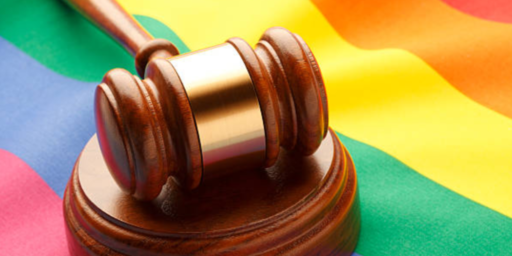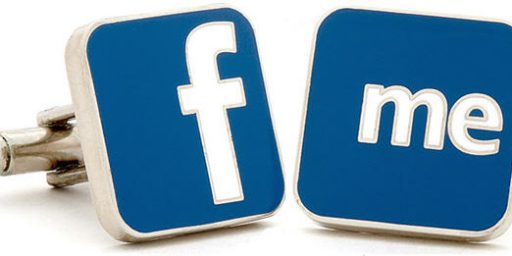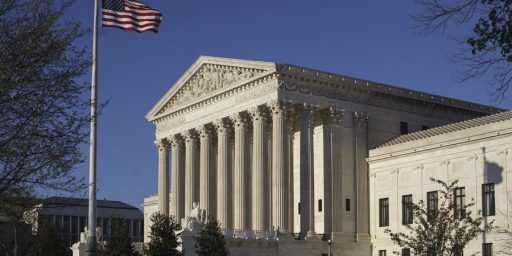‘Gay’ Résumé Not Okay?
Listing affiliation with gay activist groups hinders one's chances of landing a job interview.
Listing affiliation with gay activist groups hinders one’s chances of landing a job interview.
The Week (“Why gay men don’t get job interviews“):
Harvard researcher András Tilcsik wanted to know if employers discriminated against gay applicants, so he and his colleagues sent out two sets of fake résumés for 1,769 office or managerial job openings in seven states. One version of the résumé suggested that the applicant was gay. The other did not. Otherwise, they were all but identical. The results? The gay “applicant” was 40 percent less likely to get called in for an interview. The study, the first of its kind, appears in The American Journal of Sociology. Here’s what you should know:
How did Tilcsik indicate that one applicant was gay?
The “gay” résumé listed a stint as treasurer of a collegiate gay organization. To separate any “gay penalty” from general anti-liberal political bias on the employers’ part, Tilcsik listed involvement with a “progressive and socialist alliance” on the other set of résumés in place of the gay group. The apparently heterosexual lefty was contacted 11.5 percent of the time; the gay treasurer was called back only 7.2 percent of the time — a 40 percent hit.What’s behind this double standard?
Geography played a pretty big role. Callback rates for the two résumés differed widely in Southern and Midwestern states — Texas, Florida, and Ohio — but were more equal in Western and Northeastern states: California, Nevada, Pennsylvania, and New York. “This doesn’t necessarily mean that there is no discrimination in those states,” Tilcsik says. “What this does show is that discrimination in white-collar employment is substantially stronger for the Southern and Midwestern states in the sample.”
This isn’t exactly shocking. Indeed, I’m shocked at the number of résumés I get that list affiliations with political activist groups of any stripe on them: it’s just asking to be put in the “REJECT” pile unless the position is with a similarly-aligned organization.
Then again, with so many people disclosing all manner of things that used to be intensely personal via social media, this may just be a fact of modern life:
But the study does suggest that it’s tough being “a proud gay man looking for a white-collar job in America,” says Jonathan Higbee in Instinct. Maybe gay men “need a bit of affirmative action.” Besides, given the ubiquitous use of social media by prospective employers and head-hunters, “being out and proud on a candidate’s Facebook profile” could negate any attempt to remove gay references from your résumé. Maybe this double standard is actually a “blessing in disguise,” says Daniel Villarreal at Queerty. Being preemptively rejected might at least protect gays from entering “a homophobic work environment.”
Despite the fact that I’ve been writing a political blog for going on nine years and sharing my thoughts on Twitter for nearly five, I’m still cognizant that everything I put up is subject to scrutiny. If you’re searching for a job, you should probably make sure your Facebook presence doesn’t raise any flags. If you’re looking for a job in corporate America, you probably shouldn’t be dressed like South Park’s Mr. Slave in your profile picture.
While prudence is advisable in shaping your public image, you shouldn’t have to hide fundamental aspects of who you are. G-rated pictures of you and your significant other, for example, are not something that should hurt your chances of landing a job. Then again, most people make their accounts visible only to “friends,” anyway.





Ding! You’d think they’d realize the peril in this, but evidently not.
Double Ding! I’m amazed at what folks will put out into the public square about themselves. (Well, maybe not so much, now that I think about it. See, ELIZA.)
When you look at my résumé, you’d never know that I’ve ever been married, much less my sexual preference. In fact, you might think I was at least 10 years younger than my real age, maybe more.
Some folks seem to forget the purpose of their résumé: to get an interview. Why on Earth would you include things that might interfere with that?
The law in its wisdom says potential employers cannot ask me things like my age, family status, ethnic background, etc.
The law does not say, however, that I cannot volunteer that information on my own.
For years my resume has included a “Biographical Information” section indicating that I am a U.S. citizen, that I was born in this country, my age, my lack of any disabilities, and the fact that I am single with no dependents (i.e., no kids to get sick and pull me away from my job).
If an employer wants to read between the lines and conclude that I’m gay, more power to ’em.
The market rewards information and punishes bigotry. All else is myopia.
Hell, in this economy employers have no choice but to “discriminate” against nearly every applicant, whether straight, gay, lefty, righty, sane, crazy, alien or actual alien from outer space.
I wonder how much of the concern was due to bias against homosexuality specifically, and how much of it was concern over litigiousness. There has been a lot of news stories lately about homosexuals suing their employers for various things, so hiring someone with a background in GLBT activism may create a concern that they’re applying in order to later sue the company. This isn’t as likely with a general lefty group. I wonder how the results would be different if the control group has been something like the National Employment Lawyers Association or something like that.
The article seems to conflate being gay with gay activism. I’m not gay, but I’ve been involved in gay activism before. I never include anything remotely political on my resume, however. What kind of an idiot do you take me for?
The comparison of being gay to dressing like a cartoon fetishist is off base and a bit offensive. It looks like he would have been rejected for admitting having a partner rather than posting revealing pictures of said partner.
Also, I’ve seen plenty of resumes listing president, treasurer, what have you, of Asian American Clubs, Hillel, etc., none of which ever struck me as more political than cultural. These positions aren’t very important but don’t seem completely inappropriate for an applicant straight out of college.
The fact that he was less likely to be rejected in the South and Midwest for the socialist club than the LGBT club makes it hard to conclude that there was anything other than discrimination at play. One is blatantly political, the other just confirms that the applicant is gay (or Asian, or Jewish).
You only have to worry about litigation if you intend to discriminate. This is no different than seeing a black applicant walk in and thinking “you know, if I’m racist this guy might sue me, I better not hire him.” There are more racial discrimination cases than gay ones, so you should probably rephrase that if you want to make an accurate point in respect to risk of litigation.
@Dan:
This seems like the civil equivalent of “if you haven’t done anything wrong, why do you care if the police search you?” In theory you shouldn’t have to worry about lawsuits if you haven’t discriminated, but I think it’s extremely naive to assume that in practice litigation only occurs when justified.
The equivalent would be an applicant who lists being the treasurer of his college’s chapter of Rainbow PUSH. If that applicant is rejected, is it because he’s black or because he’s associated with an organization known for costly discrimination lawsuits?
@Dan: I’m not saying that most gays are leather fetishists. I’m saying that, if you’re looking to get hired in corporate America, you don’t let your freak flag fly in your public persona.
For the most part, aside from honor societies and purely civic organizations, I’d recommend people leave affiliate memberships off their resumes, period. They likely won’t help and they might hurt.
For that matter, I’d recommend males go in clean shaven and with a conservative haircut for job interviews unless something else is the norm in the industry. Having a beard or very long or very short hair likely won’t help and they might hurt.
@Stormy Dragon: In most states its legal to discriminate against someone based upon sexual preference, so it wouldn’t be obvious that fear of litigation is a factor. People could subjectively believe they might be subject to litigation and change their behavior though.
@Stormy Dragon:
Yes, and in reality, not theory, an employer is still more likely to face a discrimination case from a black person than a gay person. If you’re going to make the point that a lawsuit is possible even without cause, you should make it about the more likely lawsuit, which you don’t seem to want to do.
That’s an awful large jump from LGBT organization to Rainbow PUSH. The article mentions nothing about the club being a radical political entity; the term “collegiate gay organization” is pretty innocuous and not at all equivalent to PUSH, so unless they’re being completely dishonest, this wasn’t ACT UP. I still maintain that the usual LGBT club is no different than Hillel. If you’ve got information that this organization is associated with high litigation against employers, I’d like to see it, otherwise this is pure conjecture.
@James Joyner:
It does still seem like you’re equating an LGBT organization with “freak flag,” since the article doesn’t mention anything more than a very common campus club, but it’s completely possible that I’m misreading this.
I suppose we’ve had different experiences with applications, because about a third of the resumes I’ve received from Cal list positions in the AAA (Asian American Association) along with plenty of other clubs (these clubs are usually the only thing close to work experience a recent grad has), and I’ve never thought of them, or heard someone else mention them, as anything near a political activist group, which I agree would be a red flag in most cases (but did not seem to be for the companies in this study).
As well as being clean shaven, I’d recommend that applicants are articulate and don’t put their feet on their prospective employer’s desk, but this still has nothing to do with being in an LGBT club.
The LGBT club at my college in the late 80s was a loud, strident political organization, frequently pulling stunts and using loudspeakers near where I wanted to nap/study. I’d put them in the same category as the loud, strident political organizations that liked to organize in front of the Planned Parenthood.
Things may have changed, and I’m getting old, but I am of the age where I review resumes for potential hires.
@PD Shaw:
I certainly understand changing times, when I was in college a gay organization would have gotten you expelled, so I’m beyond getting old, but I do meet enough young people involved in cultural clubs to know that the ones in leadership roles are there more to develop leadership skills and be involved in faculty-student dialog than cause riots. Clashes between Hillel and Palestinian groups have eclipsed LGBT campus mischief for at least a decade.
It does seem reasonable that older employers who don’t do active campus recruitment would likely react more based on their own college experiences than the applicant’s. This will hopefully change as my generation retires.
Still, assuming that the eastern and western employers were the same age as the Southern and Midwestern, I don’t see how the results can be seen as anything other than discrimination based on the well established differences in regional views of homosexuality.
@Dan:
Objectively a college LGBT organization is more like AAA than Rainbow PUSH. But since LGBT activists are in the news more often in relation to lawsuits than AAA, they may incorrectly be perceived as being more like Rainbow PUSH.
And I’m sure bias is part of it as well. I was just pointing out that the study as designed is measuring more than one thing and then assuming a single cause. It would be nice if they could come up with some way of better separating the effect of different causes by using more than just the two groups mentioned.
This brings up the question of the value of these college organizations anyway: usually just an excuse to get drunk or participate in similar worthless depravities. Any organization on a college campus should be there only to help others, like a toy or food drive, Bible club, science fairs, athletic boosters, tutoring children, or help maintaining the grounds. There should be a strict code of conduct, a dress code, and ethics for any organization on a college campus: rule #1 – no alcoholic beverages.
I work for a political consulting firm, and manage campaigns by trade–and even I don’t include political activism on my resume.
@Racehorse:
I don’t think you’ve been involved with any sort of college organization (or have been on a college campus) in quite awhile. Your statement strikes me as quite naive as to how most college organizations work, thrive, and function. Basing your prescription off of what you think a college campus is like?
When I was a college student, the rules were strict. There was a dress code: dress shirts and pants. The instructors were respected: we stood when they came in and when they left the class. We did not have time to goof off, party, or cause mischief. It wasn’t a military college, but it sure seemed like it. Overall, it was a great experience and provided much growth for me.
@James Joyner:
Being gay is letting your freak flag fly?
See, it all depends on what job you’re after. My resume includes past troubles with the law, a period of homelessness, rootlessness, dropping out of both high school and college, recreational drug use, skirt-chasing, bouts of depression, barely-contained rage, boozing, surliness, talking to people who aren’t there, inappropriateness, and an insistence on black t-shirts for all occasions.
Kind of a bit much if I were looking to join a law firm. Standard for a fiction writer.
@michael reynolds: sounds like press guide of the Miami Hurricanes football team
@Racehorse:
Ok, I’ll bite. You said you worked your way through college in the 70’s in another thread. Care to share which school? I’m betting it was a Jesuit school…
From what I know about the history of a number of colleges at all levels (from regional to Elite Research 1), most of the stuff you described died out by the late 40’s — at least in the North (East, Central, and West). The exception would be single sex/religious (including Jesuit) school.
Oddly enough, the first thing I thought of was Pajamas Media’s investigation into the Justice Department hiring mess — how (as far as I remember) pretty much every single hire has a lengthy history of very liberal activism — no conservatives, and no apolitical types. So the advice given here by most folks (except michael) would be exactly the wrong thing if you wanna get into the Obama/Holder Justice Department.
J.
Yes of course, because everything under the sun comes back to “the Obama/Holder Justice Department”…
@An Interested Party: Not quite everything, but a lot.
I just recall reading Pajamas Media’s articles, and noting how many new hires at the Justice Department had gay activist group backgrounds. It wasn’t overwhelming — the theme was liberal activism in general — but quite a few had been very influential in the legal advancement of gay rights. It was the contrast that struck me — here James brings up how listing such experiences can hurt an applicant, but in this particular case just the opposite seems true.
J.
I didn’t realize people your age would be on the internet. Heck going by that description “in front of a colour TV” would have been a stretch.
😉